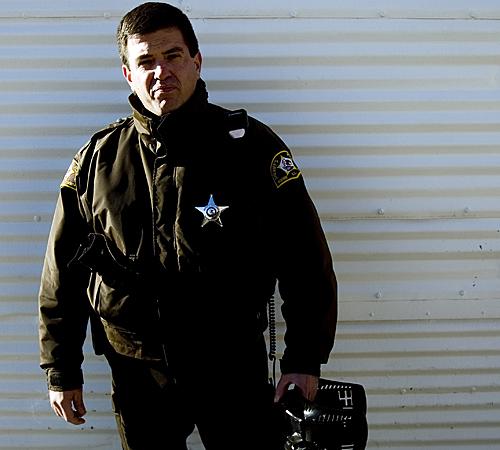UI Police Training Institute students rely on teamwork

Ray Herschberger, a trainee from Boone County, takes a break before going back inside to warm up between outdoor combat training for the Police Training Institute, Nov. 28. Herschberger served 20 years in the United States Marine Corps. Erica Magda
December 5, 2007
Newly recruited police officers from departments throughout the state learn to depend on one another from their first day at the University’s Police Training Institute. Each morning, students begin their days with physical training in their assigned units. Then a break for breakfast. Then class from 8 a.m. until noon. Then a break for lunch. Then practical skill tests. Followed by a break for dinner and night classes.
Students are also encouraged to get into study groups and use other’s strengths, said W. Michael Miller, associate director of the institute.
Considered the premier officer instruction facility in the state of Illinois, the training institute hosts officers from agencies all over the state within its facility at the intersection of Fourth and Chalmers streets to learn the ins and outs of police work.
“We impress upon recruits (the importance of) teamwork with scenarios because each of the officers will work through them,” Miller said. “It gives them a sense of ownership.”
Recruits sent to the Champaign facility participate in a 12-week, 480-hour course of basic skills before returning to their agencies as fully trained police officers.
Get The Daily Illini in your inbox!
While each recruit faces the same challenges at the institute, their motivations for entering the law enforcement field are as varied as the exercises they must complete.
Growing up in Danville, Ezzard C. Hoskins Jr., a recruit from the University’s own police force, learned firsthand that in such a “fragmented community” people in positions of authority could have an effect on citizens.
“Its not just home that brings up the kids but also the community,” said Hoskins, who is in his final week of training.
Hoskins said he wanted to go into a law enforcement career to build similar relationships with the juveniles in his community.
“My long-term goal is to deal with children in general and stop them before they get into the (criminal justice) system,” he said. “I want to teach them how to survive outside of the home.”
Hoskins said he feels that the curriculum the institute offers will help him achieve this goal and improve his interactions with people of various backgrounds, whether they are members of the military, moms, dads, teachers, or landscapers.
“We get the full scope of things from firearms to verbal communications. We’re learning how to deal with adversity with social interactions because people we are different from have different needs,” he said. “Being respectful is more important than anything else.”
Another recruit soon to graduate from the institute is 40-year-old Ray Herschberger, an ex-Marine originally from Arcola. Although many counties in Illinois have a cutoff age of 32 for applicants, the Boone County Sheriff’s Department, located near Rockford, is not one of them.
“Boone County was looking for deputies and after 20 years in the Marine Corps, I had to be where the action was at,” said Herschberger, who is in his 12th and final week of training at the institute.
He was hired by the department in September and has been training at the institute since then.
“(The institute) does great training, and a lot that is taught in the military transfers over,” Herschberger said. “The law aspects are the most different with their perspective of legality on situations.”
During his service in the Marine Corps, Herschberger spent time in Afghanistan and said such an environment forced servicemen to be on their guard constantly.
“We had random fire and 10 rockets launched into our base at 2 a.m., and mortar rounds fired at us every Thursday,” he said.
The Army unit that preceded Herschberger’s unit affectionately deemed the event “Mortar Thursday,” and after living in such a stressful environment, he said it is exciting to get back on the street.
“Here it’s different. You have a person’s life in your hands,” he said between drags of a cigarette during a break from a drill. “But it’s also the same because it’s either you, (the offender) or your buddy, and at the end of the day it better be you and your buddy (left standing).”
Teamwork is a resonating value of the institute, rooted in the instructors who guide the recruits as much as class exercises.
“They are working with each other just like they will when they go back to their agencies,” said Doug Needham, police training specialist. “Working with people they’re familiar with makes (training) fun.”
Needham retired as a lieutenant in 2000 after 21 years of service in Aurora, and has been an instructor at the institute since 2007. He spent much of his career in international law enforcement.
“I can’t retire,” he said as his students took a break from a lecture on crime scene sketching Thursday. “I need structure.”
Needham said that as an instructor he wants to ensure his students are “well grounded in the basics” when they leave the institute.
“This is the only place where they get role players and a room is set up for them to process a scene,” Needham said. “They get actual experience with procedures.”
Editor’s note: This is the second in three-part series of articles profiling the University of Illinois Police Training Institute, which trains recruits from departments across the state through classroom instruction and created simulations.






